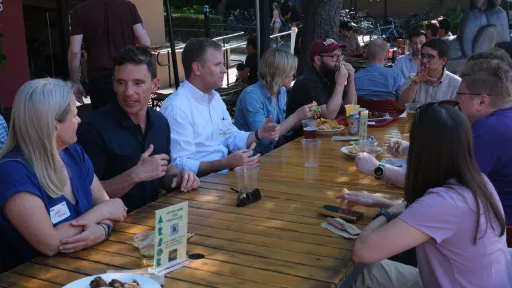
This year’s Stanford WebCamp (SWC) ran May 8 (online) and 9 (hybrid) was an outstanding conference. This free event at Stanford is a must-attend for members of the Bay Area web community with a particular interest in the use of web tools in higher education. It was a great opportunity to catch up on industry trends and have time for in-depth conversations with colleagues. If you didn't have the chance to attend, all of the presentations are posted on YouTube.
Organizers’ decisions impact the quality of the conference and foster or hinder the conversation. In-person conference attendance generally seems to be smaller post-COVID. On SWC’s hybrid day, ~50 people attended in person. All the presenters were on site, or IRL, that day.
The quality of conference experience is greatly enhanced by attending in person. On-site attendees benefit from the ability to interact with the presenter without delays or lags that can come with using technology. Also, in person allows you to have related "off-topic" conversations post presentation. Lastly, you just can’t underestimate the value of those impromptu hallway or picnic table conversations that were enriching and potentially invaluable, but can only take place when your colleagues are physically present.
Luke McCormick's presentation "Web Coding for Non-Coders -- using AI, of course" was a nice intro talk, but the limitations of a hybrid setup became clear. With three people in the room, and maybe 10 people remote, the speaker missed the added dimension that a room full of 13 interested people attending can contribute and feed. In-room feedback is valuable to the presenter. It helps to see others' interest, or confusion. The hybrid setup requires orientation for both the speaker and the online attendees. Even with the good job of the technical support team there were bumps in getting started and during the Q&A.
An excellent talk was by Jordan Koplowicz’s Creating an AI Chatbot in Drupal: The Easy Way, because it was a really helpful how to guide for setting up a chatbot. Jordan took the audience through all the steps and got to a demo-able Chatbot. Super cool! With at least 20 people in person IRL, and a decent online crowd, the dynamic interaction with the crowd really enhanced the learning experience. Jordan responded to questions throughout the presentation, which helped to deepen the audiences understanding. Even though Jordan repeated the questions from the in-person audience for the online folks, it felt like the online participants missed feedback opportunities because they were literally "not in the room".
Now onto the part that just can’t be done well at a hybrid event, if you’re remote: the spontaneous discussions with colleagues that happen in the hallways, over coffee, at lunch, and at happy hour. Learning a via conversation at at SWC, DrupalCon, and BADCamp led to many of the technology choices made at UCSF. Build a shared installation package, leverage cloud hosting, build a strong on boarding, leverage automation. All of these steps are why UCSF was able to build over 100 websites in the first month of starting up it's service! (Many thanks to Shawn DeArmond, Zach Chandler, and Brian Wood). There advice was critical in the early stage of UCSF's web services program.
In person conversations at conferences with colleagues likeh Owen Lansbury and Sara Worrell-Berg informed later technical and process decisions. These conversations alone provide so much value to attendees. Make time for conversations, not just sessions. The back and forth, the dialog, and hybrid cannot really capture that.
Maybe someday there will be a better system for hybrid conferences, but we recommend in person events for the time being. We are looking forward to seeing more folks IRL, and consider visiting Oakland for BADCamp September 25-26! It's free and open to anyone interested in building out the open web.
